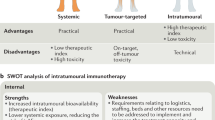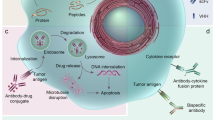Abstract
A bispecific mouse monoclonal antibody (mAb) that recognises carcinoembryonic antigen (CEA) with one binding site and vinblastine (VLB) with the other was used, and its in vivo immunosuppressive effect specific for anti-mouse immunoglobulin (Ig) was studied. The antibody was incubated with VLB at a molar ratio (MR) of 1:1, and administered i.v. to rabbits. Control animals received either the MAb alone, or the MAb with VLB covalently linked (MR 1:1), or the parental anti-CEA with equimolar amount of VLB. Seven days later, the rabbit anti-mouse Ig primary response was measured, and found to be almost 55% reduced in the animals that received the VLB 'loaded' MAb. In vivo kinetics and stability experiments revealed that the T1/2 of the MAb was 68 +/- 5 h, whereas free VLB disappeared within minutes. It was concluded that as soon as the drug dissociates from the antibody's binding site, it is rapidly removed. This problem was overcome by subcutaneously implanting osmotic mini-pumps containing VLB. The pumps released the drug at a constant rate for a period greater than 1 week, saturating the antibody's binding site. Under these conditions rabbits developed 80% less anti-mouse Ig antibodies when the bispecific antibody was administered (compared with the parental anti-CEA). The immunosuppression observed was specific for the mouse Ig, under conditions compatible with the full clinical therapeutic potential of the MAb. In conclusion, these experiments show, that it is possible to develop hybrid antibodies that can act as a 'lethal bait' to any specific lymphocyte in vivo, thus preventing undesirable responses against the xenogeneic MAb.
This is a preview of subscription content, access via your institution
Access options
Subscribe to this journal
Receive 24 print issues and online access
$259.00 per year
only $10.79 per issue
Buy this article
- Purchase on Springer Link
- Instant access to full article PDF
Prices may be subject to local taxes which are calculated during checkout
Similar content being viewed by others
Author information
Authors and Affiliations
Rights and permissions
About this article
Cite this article
Sivolapenko, G., Moreno, C., Smith, W. et al. Xenogeneic monoclonal antibodies in the management of cancer: control of their in vivo immunogenicity and induction of specific unresponsiveness using an antibody-drug immunoconjugate. Br J Cancer 64, 281–287 (1991). https://doi.org/10.1038/bjc.1991.292
Issue Date:
DOI: https://doi.org/10.1038/bjc.1991.292



